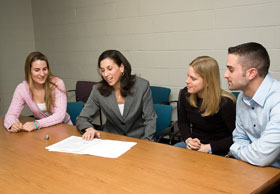  |
| HOME | THIS ISSUE | CALENDAR | GRANTS | BACK ISSUES | < BACK | NEXT > |
Nutritional scientist's teaching extends beyond classroom
by Karen Singer - February 21, 2006 |
||||
|
Nancy Rodriguez believes in the practical application of classroom instruction. That’s why she scours professional journals, newsletters, and the Internet, seeking the latest information on sports nutrition and medical nutrition therapy for her lectures. It’s also why she hands out lecture outlines: so students will engage in analytical thinking and discussion during class, rather than note-taking. “They need a good comprehensive understanding of theory – and how to actually use it in the real world,” says Rodriguez, an associate professor in the Department of Nutritional Sciences and one of this year’s University Teaching Fellows. But Rodriguez’s teaching style and philosophy extend far beyond the classroom. She assists UConn coaches and athletic teams, providing nutritional information aimed at producing optimal athletic performance. She also spearheaded the establishment of interdisciplinary minors in sports nutrition and nutrition for exercise and sport. And, say current and former students, she inspires by example. Rodriguez grew up in West Virginia, beginning her college studies as an elementary education major. She soon turned her focus to human nutrition, after taking an introductory course in her freshman year. Graduating in 1978 from Virginia Polytechnic Institute and State University with a bachelor’s degree in human nutrition and foods, Rodriguez became a dietitian in a local hospital. While studying for a master’s degree in nutrition at West Virginia University, she discovered that she had what she calls “a natural knack” for biochemistry. She stayed on to earn a Ph.D. in that field, and did post-doctoral research in nutritional physiology and endocrinology at the Mayo Clinic in Rochester, Minn. After several teaching posts in West Virginia and Massachusetts, she began her career at UConn in 1991 as an assistant professor. Rodriguez’s nutritional physiology research focuses on amino acid metabolism and protein utilization from sources such as milk, egg, and meat. “A lot of my work has been funded by the commodity boards,” she says, adding that her studies range from metabolic activity in athletes and active adults to pediatric obesity management. This month, Rodriguez began recruiting participants for a two-year study examining whether the type of protein one eats makes a difference in one’s ability to maintain lean body mass while consuming an insufficient amount of calories. A former personal trainer, Rodriguez now maintains a small private practice, advising clients on weight loss and weight management. She lectures to groups of from 18 to 50 students, teaching juniors, seniors, and graduate students. “They’re focused and want to get their money’s worth,” she says. “They’re not afraid to ask questions. They want to know when they finish they’re going to get a job, and what they’re going to earn.”
Doctoral student Lisa Vislocky finds Rodriguez’s abundant energy and enthusiasm infectious. “You learn on a daily basis,” says Vislocky, who works in Rodriguez’s lab. “Dr. R is with us all the time, and she encourages us to think.” Rodriguez is especially proud of her role in launching former students into “some really nice sports jobs.” One recent graduate, for instance, helped the U.S. Olympic ski team prepare for this year’s games in Turin, Italy. “Her teaching and/or mentoring style sets her apart in my mind from a lot of professors,” says Douglas Bolster, who graduated in 2001 with a Ph.D. in kinesiology. He is now a research scientist at the NASA Johnson Space Center in Houston, Texas, studying effective countermeasures for skeletal muscle atrophy. Rodriguez was Bolster’s co-major advisor for his dissertation. “She was simply always available to me as a graduate student,” he says. “Her open-door policy allowed me to address issues related to my research or logistics in setting up an experiment. She gave me independence to execute tasks without micro-managing my efforts. “Finally,” Bolster adds, “she gave me the opportunity to be involved with the grant-writing process and to publish our findings in peer-reviewed manuscripts. This ability to publish served as a huge springboard for my subsequent post-doctorate work and the research that I focus on now.” Rodriguez knows the inner workings of athletes. A former dancer who performed in a West Virginia modern dance troupe, she currently keeps fit playing competitive tennis, and sometimes can be seen jogging around campus. Since 2002, Rodriguez has overseen sports nutrition services for the division of athletics as a member of the sports medicine team. She and members of her sports nutrition team develop menu options and nutrition education materials for UConn athletic teams, often working one-on-one with athletes. “This year, we’ve focused on nutrition for recovery after exercise,” she says. “One of our goals is to provide the student-athletes with lifestyle tools.” |
| ADVANCE HOME UCONN HOME |

